【英语】一般将来时(完整版)
- 格式:doc
- 大小:66.50 KB
- 文档页数:9
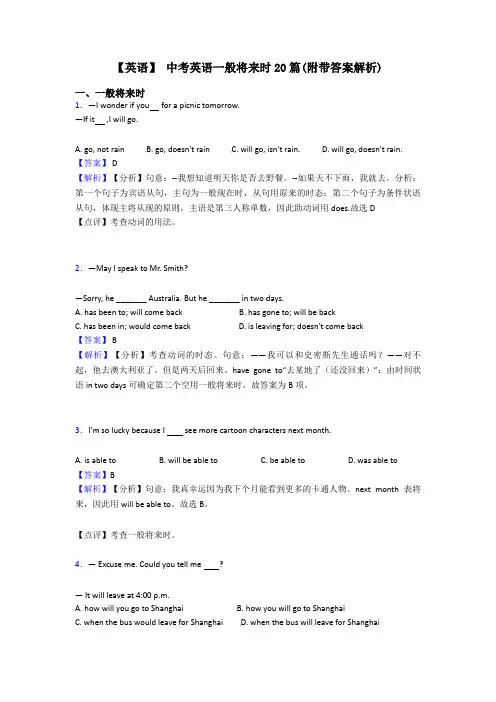
【英语】中考英语一般将来时20篇(附带答案解析)一、一般将来时1.—I wonder if you for a picnic tomorrow.—If it ,I will go.A. go, not rainB. go, doesn't rainC. will go, isn't rain.D. will go, doesn't rain.【答案】 D【解析】【分析】句意:--我想知道明天你是否去野餐。
--如果天不下雨,我就去。
分析:第一个句子为宾语从句,主句为一般现在时,从句用原来的时态;第二个句子为条件状语从句,体现主将从现的原则,主语是第三人称单数,因此助动词用does.故选D【点评】考查动词的用法。
2.—May I speak to Mr. Smith?—Sorry, he _______ Australia. But he _______ in two days.A. has been to; will come backB. has gone to; will be backC. has been in; would come backD. is leaving for; doesn't come back【答案】 B【解析】【分析】考查动词的时态。
句意:——我可以和史密斯先生通话吗?——对不起,他去澳大利亚了。
但是两天后回来。
have gone to“去某地了(还没回来)”;由时间状语in two days可确定第二个空用一般将来时,故答案为B项。
3.I’m so lucky because I see more cartoon characters next month.A. is able toB. will be able toC. be able toD. was able to【答案】B【解析】【分析】句意:我真幸运因为我下个月能看到更多的卡通人物。
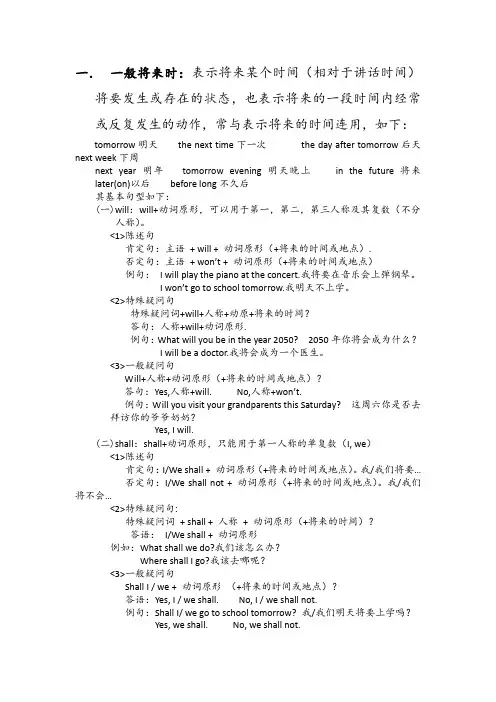
一.一般将来时:表示将来某个时间(相对于讲话时间)将要发生或存在的状态,也表示将来的一段时间内经常或反复发生的动作,常与表示将来的时间连用,如下:tomorrow明天the next time下一次the day after tomorrow后天next week下周next year明年tomorrow evening明天晚上in the future将来later(on)以后before long不久后其基本句型如下:(一)will:will+动词原形,可以用于第一,第二,第三人称及其复数(不分人称)。
<1>陈述句肯定句:主语+ will + 动词原形(+将来的时间或地点).否定句:主语+ won’t + 动词原形(+将来的时间或地点)例句:I will play the piano at the concert.我将要在音乐会上弹钢琴。
I won’t go to school tomorrow.我明天不上学。
<2>特殊疑问句特殊疑问词+will+人称+动原+将来的时间?答句:人称+will+动词原形.例句:What will you be in the year 2050? 2050年你将会成为什么?I will be a doctor.我将会成为一个医生。
<3>一般疑问句Will+人称+动词原形(+将来的时间或地点)?答句:Yes,人称+will. No,人称+won’t.例句:Will you visit your grandparents this Saturday? 这周六你是否去拜访你的爷爷奶奶?Yes, I will.(二)shall:shall+动词原形,只能用于第一人称的单复数(I, we)<1>陈述句肯定句:I/We shall + 动词原形(+将来的时间或地点)。
我/我们将要…否定句:I/We shall not + 动词原形(+将来的时间或地点)。
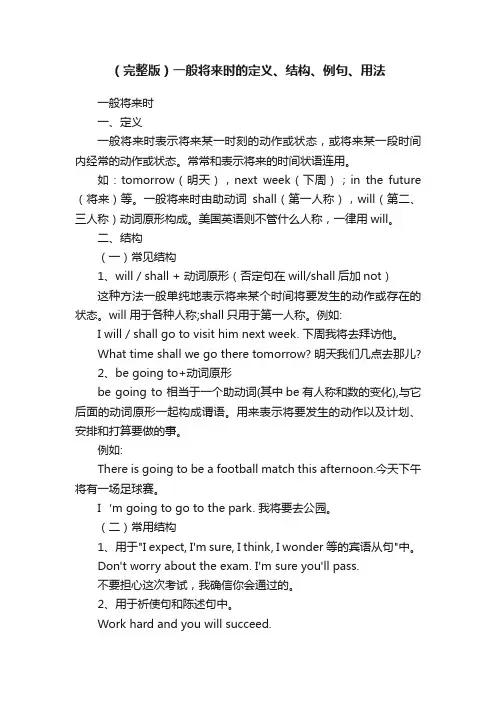
(完整版)一般将来时的定义、结构、例句、用法一般将来时一、定义一般将来时表示将来某一时刻的动作或状态,或将来某一段时间内经常的动作或状态。
常常和表示将来的时间状语连用。
如:tomorrow(明天),next week(下周);in the future (将来)等。
一般将来时由助动词shall(第一人称),will(第二、三人称)动词原形构成。
美国英语则不管什么人称,一律用will。
二、结构(一)常见结构1、will / shall + 动词原形(否定句在will/shall后加not)这种方法一般单纯地表示将来某个时间将要发生的动作或存在的状态。
will用于各种人称;shall只用于第一人称。
例如:I will / shall go to visit him next week. 下周我将去拜访他。
What time shall we go there tomorrow? 明天我们几点去那儿?2、be going to+动词原形be going to 相当于一个助动词(其中be有人称和数的变化),与它后面的动词原形一起构成谓语。
用来表示将要发生的动作以及计划、安排和打算要做的事。
例如:There is going to be a football match this afternoon.今天下午将有一场足球赛。
I‘m going to go to the park. 我将要去公园。
(二)常用结构1、用于"I expect, I'm sure, I think, I wonder等的宾语从句"中。
Don't worry about the exam. I'm sure you'll pass.不要担心这次考试,我确信你会通过的。
2、用于祈使句和陈述句中。
Work hard and you will succeed.如果你努力,就会成功的。
3、与表示时间或条件的状语从句连用。

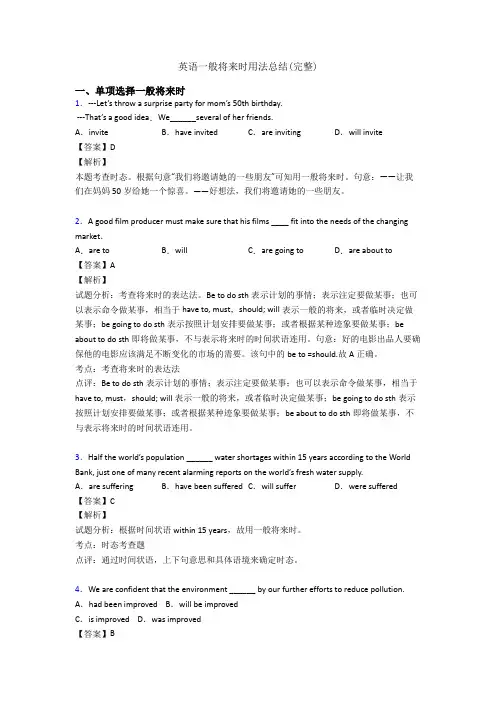

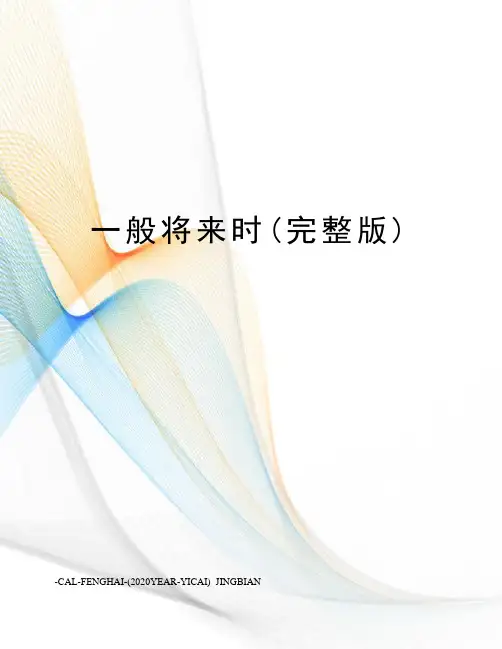
一般将来时(完整版) -CAL-FENGHAI-(2020YEAR-YICAI)_JINGBIAN一般将来时(完整版)一、单项选择一般将来时1.---I don’t know when _____ tomorrow.---I will call you as soon as he_____.A.will he come; arrives B.he will come; arrivesC.he will come; will arrive D.will he come; will come【答案】B【解析】考查时态。
第一句为when 引导的宾语从句,从句的时态,要根据时态本身来决定,第二句为if 引导的条件状语,主句为一般将来时,从句要用一般现在时,代替将来时,故选答案为B2.China's present environment situation is from bad to worse and if we _________ now to protect the environment, we’ll live to regret it.A.hadn’t acted B.haven’t acted C.don’t act D.won’t act【答案】C【解析】试题分析:句意:中国目前的环境状况越来越糟糕,如果我们现在不采取行动来保护环境,我们将会后悔。
if引导的条件状语从句,主句为一般将来时态,if从句用一般现在时态,选C。
考点:考查时态3. - Will you be available at three o'clock tomorrow afternoon?- No. I ______ a lecture then.A.are attending B.will have attended C.will attend D.will be attending 【答案】D【解析】试题分析:考查动词时态。
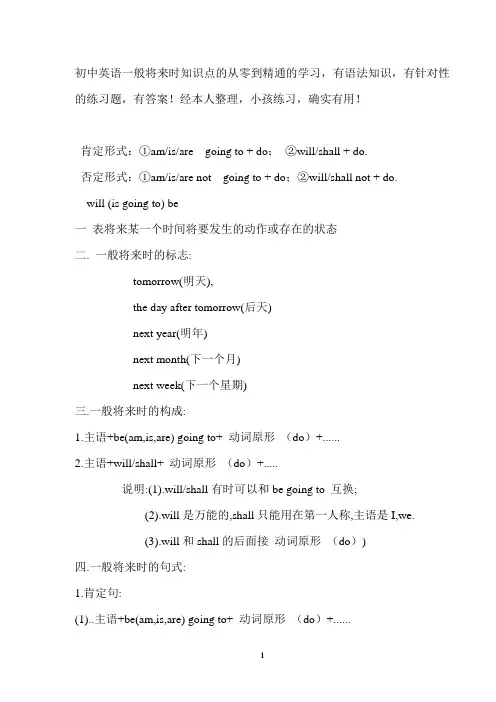
初中英语一般将来时知识点的从零到精通的学习,有语法知识,有针对性的练习题,有答案!经本人整理,小孩练习,确实有用!肯定形式:①am/is/are going to + do;②will/shall + do.否定形式:①am/is/are not going to + do;②will/shall not + do.will (is going to) be一表将来某一个时间将要发生的动作或存在的状态二. 一般将来时的标志:tomorrow(明天),the day after tomorrow(后天)next year(明年)next month(下一个月)next week(下一个星期)三.一般将来时的构成:1.主语+be(am,is,are) going to+ 动词原形(do)+......2.主语+will/shall+ 动词原形(do)+.....说明:(1).will/shall有时可以和be going to 互换;(2).will是万能的,shall只能用在第一人称,主语是I,we.(3).will和shall的后面接动词原形(do))四.一般将来时的句式:1.肯定句:(1)..主语+be(am,is,are) going to+ 动词原形(do)+......(2)..主语+will/shall+ 动词原形(do)+.....2.否定句:(1)..主语+be(am,is,are) not going to+ 动词原形(do)+......(2)..主语+will/shall not+ 动词原形(do)+.....3.一般疑问句:(1).Am/Is,Are+主语+going to+ 动词原形(do)+....(2).Will//shall+主语+ 动词原形(do)+...4.特殊疑问句:(1).What (Where, How...)+be (am,is,are)+主语+ going to + 动词原形(do)+...?(2). What (When,Where,How...) +will/shall+ 主语+ 动词原形(do)+...?二、基本结构:①be going to + do;②will+ do.三、否定句:在be动词(am, is, are)后加not或will后加not成won’t。
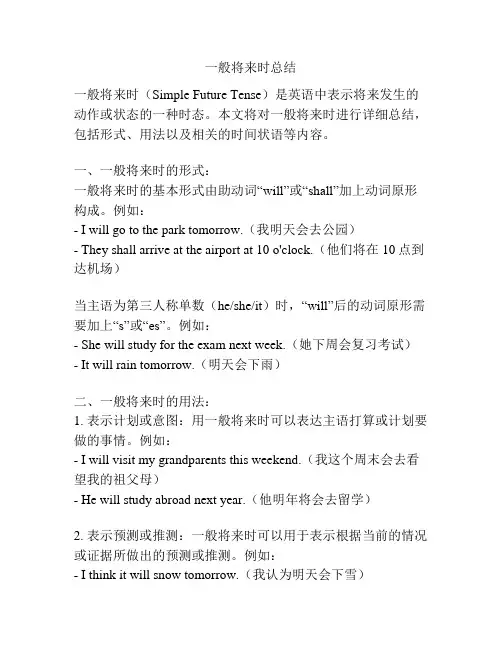
一般将来时总结一般将来时(Simple Future Tense)是英语中表示将来发生的动作或状态的一种时态。
本文将对一般将来时进行详细总结,包括形式、用法以及相关的时间状语等内容。
一、一般将来时的形式:一般将来时的基本形式由助动词“will”或“shall”加上动词原形构成。
例如:- I will go to the park tomorrow.(我明天会去公园)- They shall arrive at the airport at 10 o'clock.(他们将在10点到达机场)当主语为第三人称单数(he/she/it)时,“will”后的动词原形需要加上“s”或“es”。
例如:- She will study for the exam next week.(她下周会复习考试)- It will rain tomorrow.(明天会下雨)二、一般将来时的用法:1. 表示计划或意图:用一般将来时可以表达主语打算或计划要做的事情。
例如:- I will visit my grandparents this weekend.(我这个周末会去看望我的祖父母)- He will study abroad next year.(他明年将会去留学)2. 表示预测或推测:一般将来时可以用于表示根据当前的情况或证据所做出的预测或推测。
例如:- I think it will snow tomorrow.(我认为明天会下雪)- They believe she will win the competition.(他们相信她会赢得比赛)3. 表示意愿或允诺:一般将来时可以表达主语的意愿或承诺要做某事。
例如:- I will help you with your homework.(我会帮你做作业)- He will stop smoking.(他将戒烟)4. 表示预定的事件或安排的计划:一般将来时可以用于表示已经安排好的事件或计划。
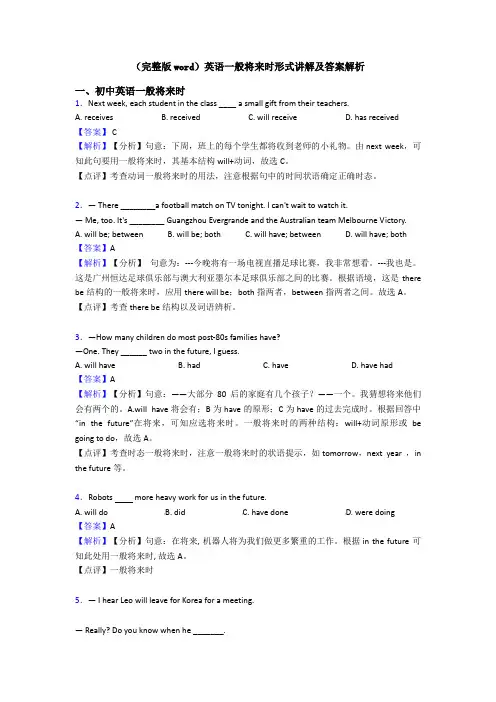
(完整版word)英语一般将来时形式讲解及答案解析一、初中英语一般将来时1.Next week, each student in the class ____ a small gift from their teachers.A. receivesB. receivedC. will receiveD. has received【答案】 C【解析】【分析】句意:下周,班上的每个学生都将收到老师的小礼物。
由next week,可知此句要用一般将来时,其基本结构will+动词,故选C。
【点评】考查动词一般将来时的用法,注意根据句中的时间状语确定正确时态。
2.— There ________a football match on TV tonight. I can't wait to watch it.— Me, too. It's ________ Guangzhou Evergrande and the Australian team Melbourne Victory.A. will be; betweenB. will be; bothC. will have; betweenD. will have; both【答案】A【解析】【分析】句意为:---今晚将有一场电视直播足球比赛,我非常想看。
---我也是。
这是广州恒达足球俱乐部与澳大利亚墨尔本足球俱乐部之间的比赛。
根据语境,这是there be结构的一般将来时,应用there will be;both指两者,between指两者之间。
故选A。
【点评】考查there be结构以及词语辨析。
3.—How many children do most post-80s families have?—One. They ______ two in the future, I guess.A. will haveB. hadC. haveD. have had【答案】A【解析】【分析】句意:——大部分80后的家庭有几个孩子?——一个。
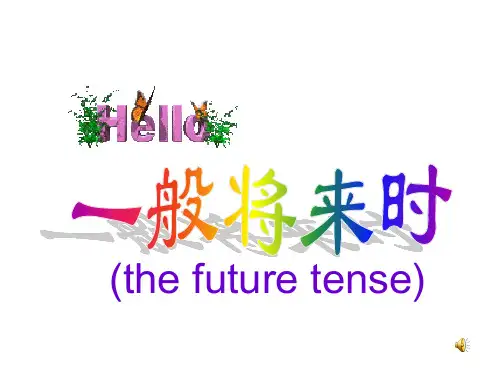
完整)初中英语一般将来时一般将来时是用来表示将要发生的动作或存在的状态,以及打算、计划或准备做某事的时态。
在句子中通常会出现表示时间的状语词,如tomorrow。
next day(week。
month。
year…),soon。
the day after tomorrow(后天)等。
一般将来时的基本结构有两种,一种是使用“be going to + 动词原形”,另一种是使用“will + 动词原形”。
如果要构成否定句,可以在be动词(am。
is。
are)后加not,或者在情态动词will后加not,形成won’t。
有些词汇也需要进行改变,如将some改为any,and改为or。
例如,将“I’m going to have a XXX.”改为否定句就是“I’m not going to have a XXX.”一般疑问句的构成是将be或will提到句首,将some改为any,将and改为or,同时第一二人称也需要互换。
例如,“We are going to go on an outing this weekend.”改为一般疑问句就是“Are you going to go on an outing this weekend?”对于划线部分的提问,一般将来时的对划线部分有三种情况。
第一种是问人,可以使用Who,例如“I’m going to New York soon.”改为问句就是“Who’s going to New York soon?”第二种是问干什么,可以使用What … do,例如“My father is going to watch a race with me this after noon.”改为问句就是“What is your father going to do with you this afternoon?”第三种是问什么时候,可以使用When,例如“She’s going to go to bed at nine.”改为问句就是“When is she going to bed?”同义句的构成是将be going to改为will,例如“I am going to go XXX.”可以改为“I will go XXX.”最基本的一般将来时结构是使用“will + 动词原形”,例如“XXX.”表示明天他们将要参观博物馆。
英语⼀般将来时⽤法总结(完整)英语⼀般将来时⽤法总结(完整)⼀、单项选择⼀般将来时1.Peace is necessary to all. After all, it is the United States and China, as the two largest economies in the world, that________ most from a peaceful and stable Asia-Pacific.A.are benefited B.will benefitC.will be benefited D.had benefited【答案】B【解析】试题分析:根据语境“美国和中国将受益于⼀个和平稳定的亚太地区”可知该句要⽤⼀般将来时,故选B。
考点:考查时态2.--- I’d like a mountain bike which ____ well?--- Will this one _____?A.rides; work B.rides; do C.is ridden; do D.is ridden; work【答案】B【解析】试题分析:考查主动形式表⽰被动含义⽤法。
⼀些不及物动词与副词连⽤,表⽰主语的特征。
如wash well,write well等;⽤主动形式表⽰被动的含义。
本句中的ride well指⾃⾏车好骑;第⼆空的do表⽰⾏。
句意:—我想买⼀辆很好骑的⼭地车。
—这个⾏吗?根据句意说明B正确。
考点:考查主动形式表⽰被动含义的⽤法。
点评:。
⼀些不及物动词与副词连⽤,表⽰主语的特征。
如wash well,write well等;⽤主动形式表⽰被动的含义。
3.It every day so far this month. I can't tell you if it tomorrow.A.rained; rains B.is raining; shall rainC.has been raining; rains D.has rained; will rain【答案】D【解析】试题分析:本题第⼀空应该使⽤现在完成式,关键词是后⾯的时间状语so far(到⽬前为⽌),so far通常都是和现在完成时连⽤。
一般将来时(完整版)的常见时间状语有哪
些?
常见的一般将来时时间状语包括以下几种:
1. Tomorrow(明天)
明天是指从现在到明天这一时间段。
2. Next week(下周)
下周是指从现在到下周这一时间段。
3. Next month(下个月)
下个月是指从现在到下个月这一时间段。
4. Next year(明年)
明年是指从现在到明年这一时间段。
5. In a week(一周后)
一周后是指从现在开始的一周之后的时间。
6. In a month(一个月后)
一个月后是指从现在开始的一个月之后的时间。
7. In a year(一年后)
一年后是指从现在开始的一年之后的时间。
8. By next week(到下周)
到下周是指在下周之前完成。
9. By next month(到下个月)
到下个月是指在下个月之前完成。
10. By next year(到明年)
到明年是指在明年之前完成。
11. Before tomorrow(在明天之前)
在明天之前指的是在明天之前完成。
12. After tomorrow(在明天之后)
在明天之后指的是在明天之后完成。
13. Soon(很快)
很快指的是即将发生的时间。
14. In the near future(在不久的将来)
在不久的将来指的是即将发生的时间段。
请注意,这些时间状语仅是一般将来时的一部分,还有其他常见的时间状语可以用于表示将来的动作或事件。
同时,时间状语的使用还需要根据具体的语境和句子结构进行适当调整。
(完整版)初⼀下英语⼀般将来时第三讲:⼀般将来时⼀、定义:⼀般将来时表⽰将来某⼀时刻的动作或状态,或将来某⼀段时间内经常的动作或状态。
1.表⽰将来某⼀时刻的动作或状态:e.g. She will buy a new bike tomorrow.We will drive to the park next week.I shall visit my grandparents this weekend.They are going to play computer games this evening.I am going to have a big meal.2.将来某⼀段时间内经常的动作或状态:e.g. He is gong to have a big house next year .She will have a daughter.The cat will have a master.The dog will have a house.⼆、常与⼀般将来时连⽤的词:1. 时间状语系列:next Tuesdaynext weeknext yearthe coming Sundaythis afternoontomorrowtonightin a few minutesin the futurein five yearsfrom now onsoon三、⼀般将来时的构成1. will/shall的⼀般将来时构成:主语 + will/shall + 动词原形+其它I will/shall go to Beijing next week.主语是第⼀⼈称时 ----- shallwill not = won’tshall not= shan’t【活学活⽤】按照要求改写句⼦1、My teacher will teach us next term.(改为否定句)___________________________________________ 2、I shall not buy new clothes this month.(改为肯定句) ___________________________________________ 3、She is playing computer games.(改为将来时)___________________________________________ 4、We shan't take part in the football match.(改为肯定句) ___________________________________________ 5、I visit my grandparents every weekend.((改为将来时) ___________________________________________ 2. be going to的⼀般将来时构成:主语+ be going to + 动词原形+ 其他She is going to play basketball this afternoon.主语是”I”时 ----- am主语为单数时 ----- is主语为复数及you时 ----- are否定句的构成: 主语 + be not going to + 动词原形+ 其他She is not going to play basketball this afternoon.is not = isn’tam not = ’m notare not = aren’twill或shall与be going to区别:1. will或shall⽤法总结:1)表⽰⼀个将来的动作或状态,“要…,会…”She will go to the park tomorrow.2)表⽰不以⼈的意志为转移的⾃然发展的事。
一.一般将来时:表示将来某个时间(相对于讲话时间)将要发生或存在的状态,也表示将来的一段时间内经常或反复发生的动作,常与表示将来的时间连用,如下:tomorrow 明天 the next time 下一次 the day after tomorrow 后天 next week 下周next year 明年tomorrow evening 明天晚上in the future将来later(on)以后before long 不久后其基本句型如下:( 一) will: will+原形,可以用于第一,第二,第三人称及其复数(不分人称)。
<1>述句肯定句:主 + will + 原形( +将来的或地点) . 否定句:主 +won’t+ 原形( +将来的或地点)例句: I will play the piano at the concert.我将要在音会上琴。
I won’tgo to school tomorrow.我明天不上学。
<2>特殊疑句特殊疑 +will+人称 +原 +将来的?答句:人称 +will+原形 .例句:What will you be in the year 2050? 2050 年你将会成什么?I will be a doctor.我将会成一个医生。
<3>一般疑句Will+ 人称 +原形( +将来的或地点)?答句: Yes,人称 +will.No,人称 +won’t.例句:Will you visit your grandparents this Saturday? 周六你是否去拜你的奶奶?Yes, I will.( 二) shall:shall+原形,只能用于第一人称的复数(I, we)<1>述句肯定句:I/We shall + 原形(+将来的或地点)。
我/ 我将要⋯否定句: I/We shall not +原形(+将来的或地点)。
我/我将不会⋯<2>特殊疑句 :特殊疑+ shall + 人称 + 原形( +将来的)?答: I/We shall + 原形例如: What shall we do?我怎么?Where shall I go?我去哪呢?<3>一般疑句Shall I / we + 原形(+将来的或地点)?答: Yes, I / we shall.No, I / we shall not.例句: Shall I/ we go to school tomorrow? 我/ 我明天将要上学?Yes, we shall.No, we shall not.( 三) be going to 结构,根据人称及单复数变换系动词be 的形式(am, is, are)。